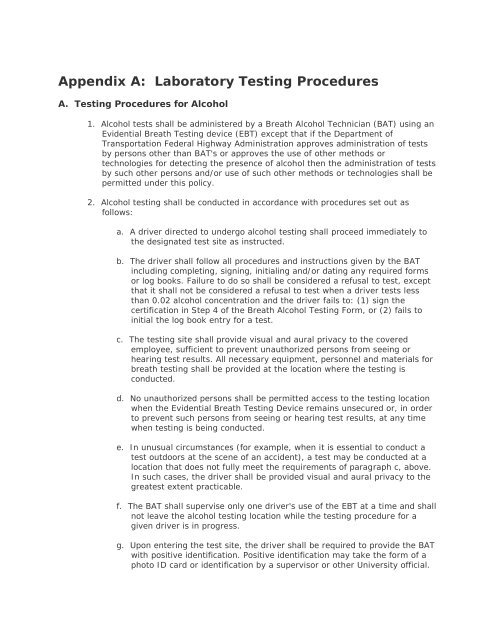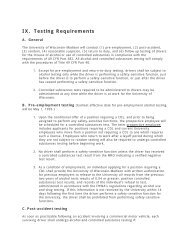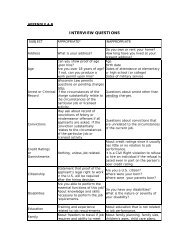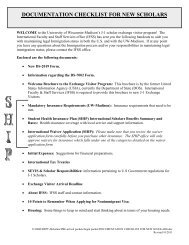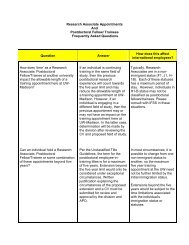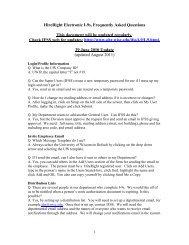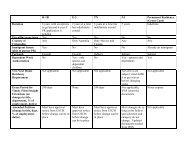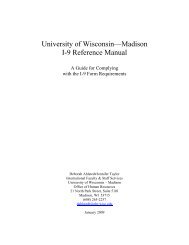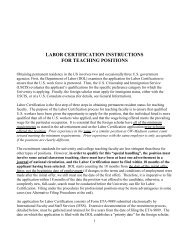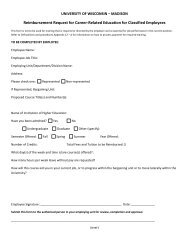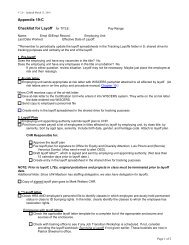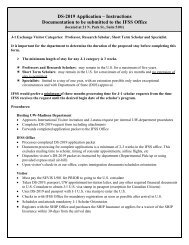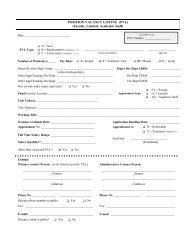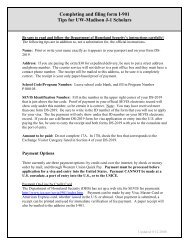Appendix A: Laboratory Testing Procedures - Office of Human ...
Appendix A: Laboratory Testing Procedures - Office of Human ...
Appendix A: Laboratory Testing Procedures - Office of Human ...
You also want an ePaper? Increase the reach of your titles
YUMPU automatically turns print PDFs into web optimized ePapers that Google loves.
<strong>Appendix</strong> A: <strong>Laboratory</strong> <strong>Testing</strong> <strong>Procedures</strong>A. <strong>Testing</strong> <strong>Procedures</strong> for Alcohol1. Alcohol tests shall be administered by a Breath Alcohol Technician (BAT) using anEvidential Breath <strong>Testing</strong> device (EBT) except that if the Department <strong>of</strong>Transportation Federal Highway Administration approves administration <strong>of</strong> testsby persons other than BAT's or approves the use <strong>of</strong> other methods ortechnologies for detecting the presence <strong>of</strong> alcohol then the administration <strong>of</strong> testsby such other persons and/or use <strong>of</strong> such other methods or technologies shall bepermitted under this policy.2. Alcohol testing shall be conducted in accordance with procedures set out asfollows:a. A driver directed to undergo alcohol testing shall proceed immediately tothe designated test site as instructed.b. The driver shall follow all procedures and instructions given by the BATincluding completing, signing, initialing and/or dating any required formsor log books. Failure to do so shall be considered a refusal to test, exceptthat it shall not be considered a refusal to test when a driver tests lessthan 0.02 alcohol concentration and the driver fails to: (1) sign thecertification in Step 4 <strong>of</strong> the Breath Alcohol <strong>Testing</strong> Form, or (2) fails toinitial the log book entry for a test.c. The testing site shall provide visual and aural privacy to the coveredemployee, sufficient to prevent unauthorized persons from seeing orhearing test results. All necessary equipment, personnel and materials forbreath testing shall be provided at the location where the testing isconducted.d. No unauthorized persons shall be permitted access to the testing locationwhen the Evidential Breath <strong>Testing</strong> Device remains unsecured or, in orderto prevent such persons from seeing or hearing test results, at any timewhen testing is being conducted.e. In unusual circumstances (for example, when it is essential to conduct atest outdoors at the scene <strong>of</strong> an accident), a test may be conducted at alocation that does not fully meet the requirements <strong>of</strong> paragraph c, above.In such cases, the driver shall be provided visual and aural privacy to thegreatest extent practicable.f. The BAT shall supervise only one driver's use <strong>of</strong> the EBT at a time and shallnot leave the alcohol testing location while the testing procedure for agiven driver is in progress.g. Upon entering the test site, the driver shall be required to provide the BATwith positive identification. Positive identification may take the form <strong>of</strong> aphoto ID card or identification by a supervisor or other University <strong>of</strong>ficial.
On request <strong>of</strong> the driver, the BAT shall provide positive identification tothe driver.h. If the result <strong>of</strong> a screening test <strong>of</strong> a driver indicates a breath alcoholconcentration <strong>of</strong> less than 0.02, no further alcohol testing <strong>of</strong> that driverwill be conducted during this testing event.i. If the result <strong>of</strong> a screening test <strong>of</strong> a driver indicates a breath alcoholconcentration <strong>of</strong> less than 0.02, the BAT will transmit the result to theUniversity's designated representative in a confidential manner. TheUniversity's representative will receive and store the information as toensure that confidentiality is maintained.j. If the result <strong>of</strong> a screening test <strong>of</strong> a driver indicates a breath alcoholconcentration <strong>of</strong> 0.02 or greater, the driver shall be required to undergo aconfirmation test.k. If the confirmation test will be conducted by a different BAT, the BAT whoconducts the screening test shall complete and sign the Breath Alcohol<strong>Testing</strong> Form and log book entry. The BAT shall provide the driver withCopy 2 <strong>of</strong> the form.l. If the BAT other than the one who conducted the screening test isconducting the confirmation test, the driver shall be required to providepositive identification in accordance with paragraph g. above, to the newBAT and the driver may request positive identification <strong>of</strong> the new BAT.m. The driver shall not eat, drink, put any object or substance in his or hermouth, and, to the extent possible, not belch during a waiting periodbefore the confirmation test. This waiting period begins with thecompletion <strong>of</strong> the screen test and shall not be less than 15 minutes.n. The confirmation test shall be conducted within 20 minutes <strong>of</strong> thecompletion <strong>of</strong> the screening test.o. If a BAT other than the one who conducted the screening test isconducting the confirmation test, the new BAT shall initiate a new BreathAlcohol <strong>Testing</strong> Form. The driver shall then complete Step 2 on the form,signing the certification. Refusal <strong>of</strong> the driver to sign the certification shallbe deemed a refusal to test.p. Refusal by the driver to complete and sign the Breath Alcohol <strong>Testing</strong>Form (Step 2), to provide breath, to provide an adequate amount <strong>of</strong>breath, or otherwise to cooperate with the testing process in a way thatprevents the completion <strong>of</strong> the test shall be noted by the BAT in the"remarks" section <strong>of</strong> the form. The testing process shall be terminated andthe BAT shall immediately notify the UW-Madison DesignatedRepresentative (UDR) who, in turn, will notify the Divisional PersonnelRepresentative (DPR).q. Refusal by the driver to complete and sign the Breath Alcohol <strong>Testing</strong>Form (step 2), to provide breath, to provide an adequate amount <strong>of</strong>
eath, or otherwise to cooperate with the testing process in a way thatprevents the completion <strong>of</strong> the test shall be deemed a refusal to test.r. If a screening confirmation test cannot be completed, or if an event occursthat would invalidate the test, the BAT shall, if practicable, begin a newscreening or confirmation test, as applicable, using a new Breath Alcohol<strong>Testing</strong> Form with a new sequential test number.s. If a driver is unable, or alleges that he or she is unable to provide anamount <strong>of</strong> breath sufficient to permit a valid breath test because <strong>of</strong> amedical condition, the BAT shall again instruct the covered employee toattempt to provide an adequate amount <strong>of</strong> breath.(1) If the driver refuses to make the attempt, the BAT shallimmediately inform UW-Madison Designated Representative (UDR)who will, in turn, notify the Divisional Personnel Representative(DPR).(2) If the driver attempts and fails to provide an adequate amount <strong>of</strong>breath, the BAT shall so note in the "remarks" section <strong>of</strong> the breathalcohol form and immediately inform the UW-Madison DesignatedRepresentative (UDR) who will, in turn, inform the DivisionalPersonnel Representative (DPR).(3) If the driver attempts and fails to provide an adequate amount <strong>of</strong>breath, the Divisional Personnel Representative (DPR) shall, inconsultation with the UW-Designated Representative (UDR), directthe driver to obtain, as soon as practicable after the attemptedprovision <strong>of</strong> breath, an evaluation from a licensed physician who isacceptable to the employer concerning the driver's medical abilityto provide an adequate amount <strong>of</strong> breath.(4) If the licensed physician determines, in his or her reasonablemedical judgment that a medical condition has, or with a highdegree <strong>of</strong> probability, could have precluded the driver fromproviding an adequate amount <strong>of</strong> breath, the driver's failure toprovide an adequate amount <strong>of</strong> breath shall not be deemed arefusal to take a test. The physician shall provide, to the University<strong>of</strong> Wisconsin-Madison, a written statement <strong>of</strong> the basis for his/herconclusion.(5) If the licensed physician, in his/her reasonable medical judgment,is unable to determine that a medical condition has, or with a highdegree <strong>of</strong> probability, could have precluded the driver fromproviding an adequate amount <strong>of</strong> breath, the driver's failure toprovide an adequate amount <strong>of</strong> breath shall be deemed a refusal totake a test. The physician shall provide, to the employer, a writtenstatement <strong>of</strong> the basis for his/her conclusion.B. <strong>Testing</strong> <strong>Procedures</strong> for Controlled Substances
Controlled substances testing shall be conducted by a laboratory certified by the U.S.Department <strong>of</strong> Health and <strong>Human</strong> Services (DHHS) and in accordance with procedures setout as follows:1. Drivers directed to undergo a controlled substances test shall proceedimmediately to the designated collection site as instructed.2. Upon entering the test site, the driver shall be required to provide the technicianwith positive identification. Positive identification may take the form <strong>of</strong> a photo IDcard or identification by a supervisor or other University <strong>of</strong>ficial. On request <strong>of</strong> thedriver, the technician shall provide positive identification to the driver.3. Drivers shall follow all procedures and instructions given by the collection siteperson. Failure to do so shall be considered a refusal to test.4. The collection site person shall collect a urine sample from the covered employeein accordance with DHHS-approved procedures.5. Drivers shall provide at least 45 ml <strong>of</strong> urine for testing. Drivers who fail to provideat least 45 ml <strong>of</strong> urine shall be subject to the provisions <strong>of</strong> paragraph 18 below.6. The collection site person shall divide the specimen into two containers. Onecontainer shall contain at least 30 ml <strong>of</strong> urine and shall be the primary specimen.The other container shall contain at least 15 ml <strong>of</strong> urine and shall be the splitspecimen.7. Both containers shall be shipped in a single shipping container, together withcopies 1 and 2 and the split specimen copy <strong>of</strong> the chain <strong>of</strong> custody form to thelaboratory.8. The laboratory shall log in the split specimen with the split specimen sealremaining in tact. The laboratory shall store the split specimen securely inaccordance with approved procedures.9. The primary specimen shall undergo a screening test for the presence <strong>of</strong>controlled substances. If the screening test detects the presence <strong>of</strong> controlledsubstances, the primary specimen shall undergo a confirmation test.10. If the result <strong>of</strong> the test <strong>of</strong> the primary specimen is negative, the laboratory maydiscard the split specimen.11. The Medical Review <strong>Office</strong>r (MRO) shall review all primary specimen results. Ifthe result <strong>of</strong> the test <strong>of</strong> the primary specimen is confirmed positive for thepresence <strong>of</strong> controlled substances, the MRO shall notify the driver that he orshe has 72 hours in which to request a test <strong>of</strong> the split specimen if theconfirmed positive test is verified as positive. If the result <strong>of</strong> the test <strong>of</strong> theprimary specimen is negative, the MRO shall have the authority to direct thedriver to undergo a retest for the presence <strong>of</strong> controlled substances if, uponreview <strong>of</strong> those results, the MRO has reason to believe the primary specimenhas been adulterated.12. If the primary specimen tests confirmed positive for the presence <strong>of</strong> controlledsubstances, the driver may request, in writing that the MRO direct that the split
specimen be tested in a different DHHS certified laboratory for presence <strong>of</strong> thedrug(s) or drug metabolite(s) for which a positive test result was obtained inthe test <strong>of</strong> the primary specimen. The MRO shall honor such a request if it ismade within 72 hours <strong>of</strong> the driver having been notified <strong>of</strong> a verified positivetest result. The driver shall be responsible for any and all costs associated withhaving the split specimen tested.13. If the driver has not contacted the MRO within 72 hours, the driver may presentto the MRO information documenting that serious illness, injury, inability tocontact the MRO, lack <strong>of</strong> actual notice <strong>of</strong> the verified positive test, or othercircumstances unavoidably prevented the driver from timely contacting theMRO. If the MRO concludes that there is a legitimate explanation for thedriver's failure to contact the MRO within 72 hours, the MRO shall direct thatthe reanalysis <strong>of</strong> the primary specimen or analysis <strong>of</strong> the split specimen, asapplicable, be performed. The driver may not request a reanalysis <strong>of</strong> theprimary specimen.14. If the result <strong>of</strong> the test <strong>of</strong> the primary specimen is positive, the laboratory mustretain the split specimen in frozen storage for 60 days from the date on whichthe laboratory acquires it. Following the end <strong>of</strong> the 60 day period, if notinformed by the MRO that the driver has requested a test <strong>of</strong> the split specimen,the laboratory may discard the split specimen.15. If the MRO directs the first laboratory in writing to forward the split specimen toa second DHHS certified laboratory, the second laboratory shall analyze thesplit specimen by GC/MS to reconfirm the presence <strong>of</strong> the drug(s) or drugmetabolite(s) found in the primary specimen. Such GC/MS confirmation shall beconducted without regard to the cut<strong>of</strong>f levels established by DHHS. The splitspecimen shall be retained in long-term storage for one year by the laboratoryconducting the analysis <strong>of</strong> the split specimen (or longer if litigation concerningthe test is pending).16. The result <strong>of</strong> the test <strong>of</strong> the split specimen shall be transmitted by the secondlaboratory to the MRO.17. If the analysis <strong>of</strong> the split specimen fails to reconfirm the presence <strong>of</strong> thedrug(s) or drug metabolite(s) found in the primary specimen, or if the splitspecimen is unavailable, inadequate for testing or untestable, the MRO shallcancel the test and report the cancellation and the reasons for it to the UW-Madison Designated Representative (UDR), the driver and to the DOT.18. A driver whose primary specimen tests positive for the presence <strong>of</strong> controlledsubstances and who requests, in accordance with paragraph 11 above, the splitspecimen be tested, shall not be permitted to perform safety sensitive dutiespending the outcome <strong>of</strong> such test. The driver may be assigned to otherappropriate non-safety sensitive duties if they are available. If not, the driverwill be released from duty pending the outcome <strong>of</strong> the test. However, if thedriver is relieved from duty and the test <strong>of</strong> the split specimen does notreconfirm the presence <strong>of</strong> the drug(s) or drug metabolite(s) found in theprimary specimen, the driver shall be paid his/her straight time salary for allregularly scheduled shifts he or she would have worked and shall bereimbursed for the costs associated with having the split specimen tested.
19. a. If the driver is unable to provide the required 45 ml <strong>of</strong> urine, the driver shallbe instructed to drink not more than 24 ounces <strong>of</strong> fluids and, after a period<strong>of</strong> up to two hours, again attempt to provide a complete sample using afresh collection container. The original insufficient specimen shall bediscarded.b. If the driver is still unable to provide an adequate specimen, the insufficientspecimen shall be discarded, testing discontinues, and the laboratory shallnotify the UW-Madison Designated Representative <strong>of</strong> the driver's inability toprovide an adequate sample.c. The MRO will refer the driver for a medical evaluation to develop pertinentinformation concerning whether the driver's inability to provide an adequatespecimen is genuine or constitutes a refusal to test. Upon completion <strong>of</strong> theexamination, the MRO shall report his/her findings to the UW-MadisonDesignated Representative (UDR) in writing. The UW-Madison DesignatedRepresentative (UDR) will inform the Divisional Personnel Representative(DPR).[Note: In a pre-employment testing situation, the University's Representativeswill determine whether or not to finalize hiring <strong>of</strong> the employee, and theMRO is not required to make such a referral.]d. If the MRO determines that the driver's inability to provide an adequatespecimen is not genuine, the driver shall be deemed to have refused to test.


